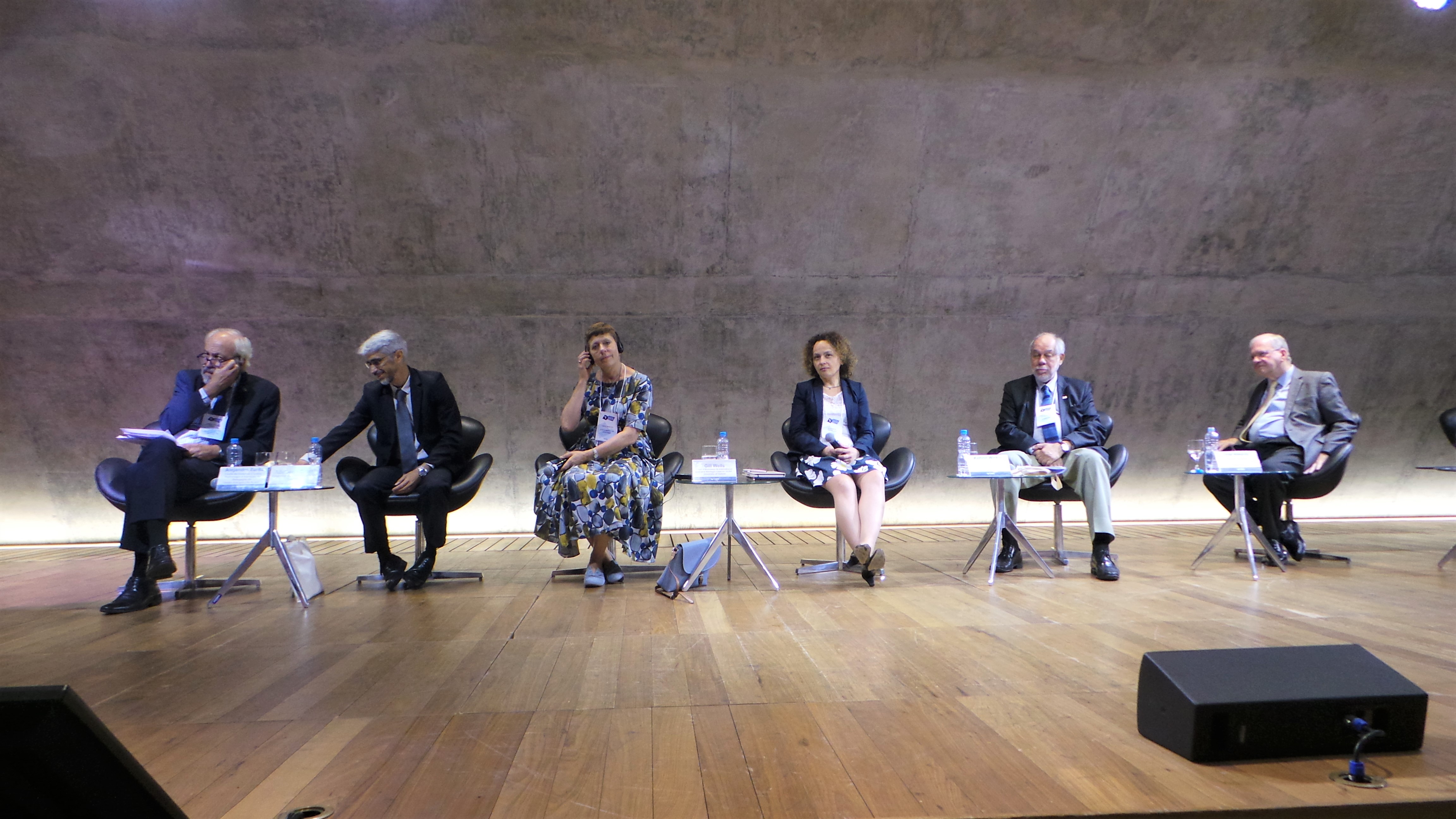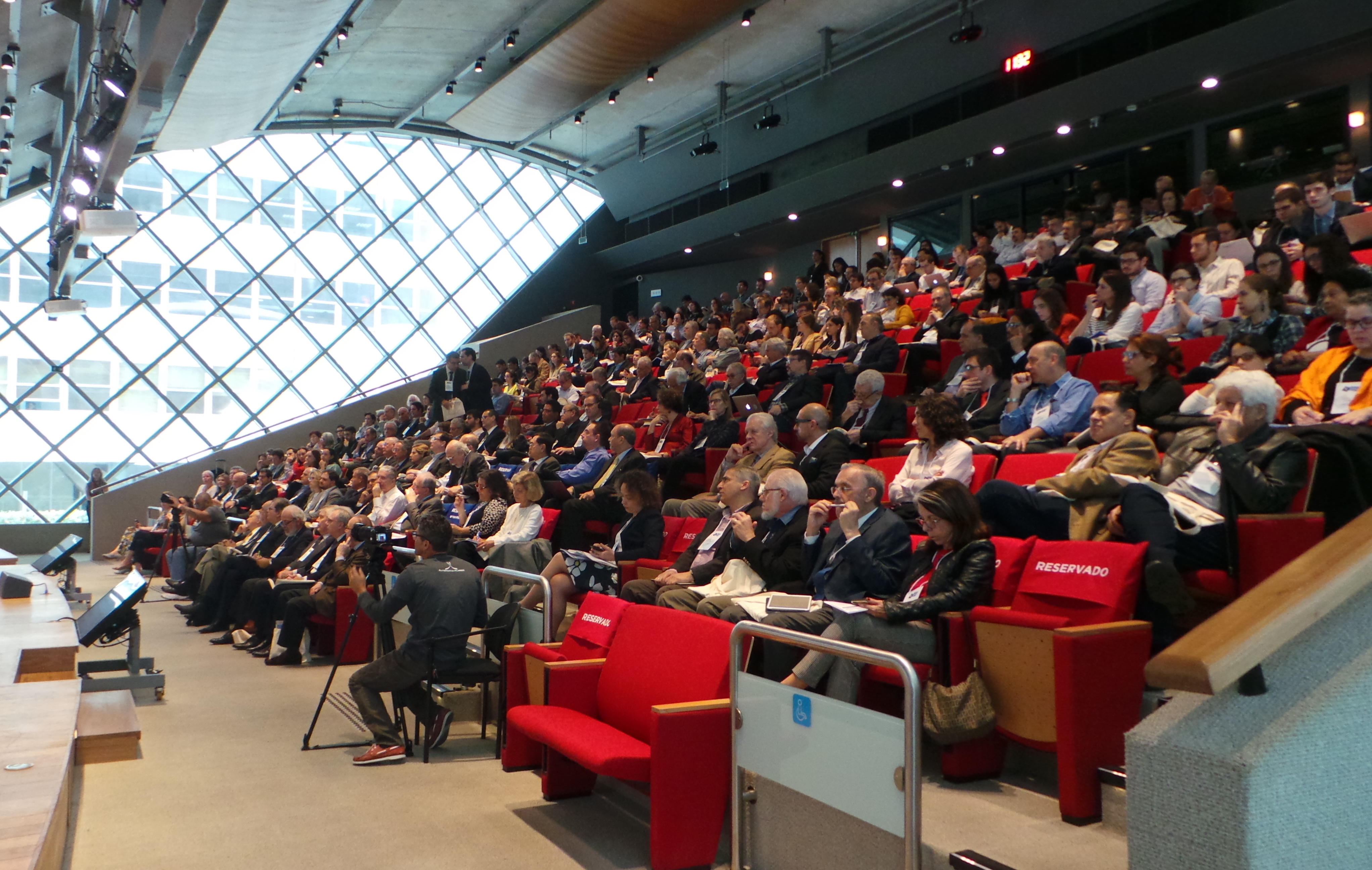FGV Colloquium with DFG Input on Scientific Impact
(11.09.19) Researchers from the FGV, universities and think tanks as well as representatives of funding institutions and the Brazilian government, came together in Rio de Janeiro for the 5th Colloquium for Applied Research of the Getúlio Vargas Foundation (FGV). Dr. Kathrin Winkler, Director of the DFG’s Latin America office, was one of the around 320 attendees at the event held on 20 and 21 August, and gave a talk during the session on assessing and measuring the economic and societal impact of scientific research.

Speakers of the panel on the topic of "Assessing and Measuring Scientific Impact in Society, the Economy, Culture and the Environment"
© FGV
At the opening of the event, FGV President Carlos Ivan Simonsen Leal touched upon the significance and the high impact of applied research on the societal and economic development of the country. He explained how it ought to be seen as a driving force for developing new concepts and innovation in society, the economy and the environment, and how its funding is very important to the FGV.
In view of future global problem areas, Leal analysed theoretical economic models and the role of the applied sciences in appropriate solutions. In the President's view, not only are the applied sciences responsible for serving and satisfying a specific and known societal need, they also have the specific task of first identifying future challenges.
Following a similar line of argumentation, in her presentation Winkler outlined specific problems associated with exclusively demanding a direct societal impact, and explained the important role that basic research plays in a pluralistic research system. She went on to describe how knowledge-driven research is just as important for societal and economic development, even though its impact is often not immediately noticeable.
The DFG is of the opinion that modern research systems should generate new methods and knowledge that not only serve contemporary society but also have the potential to bring about solutions to future and unknown problems.
"Knowledge-driven research with a broad disciplinary and thematic basis provides a vast "knowledge repository", from which programme-oriented research can make a swift contribution to solving current challenges that are often unanticipated by society," explained Winkler.
Winkler went on to argue that although impact-based funding is absolutely legitimate, it can lead to a greater concentration of research into existing problems, as such a funding system would honour these contributions. In the case of a research system that disproportionally requires a direct societal impact, there is the risk that the knowledge-driven research would increasingly lose importance and the research system would become weakened as a whole.
"For this reason, it is particularly important to offer scope for research funding that is exclusively based on scientific criteria, as is the case in the DFG programmes," said Winkler. The pluralistic German system satisfies both pillars – just as funding basic research is the responsibility of the DFG, there are funding and research institutions for programmatic research offering a potential societal or economic impact.

Audience with around 320 attendees of the 5th FGV Colloquium for Applied Research
© FGV
One DFG partner organisation at the federal level, CAPES was represented by Prof. Dr. Adalberto Grassi. Following considerable growth in the number of programmes, enrolments and completed degrees between 2006 and 2017, the funding institution now intends to pursue qualitative improvements. This involves calling for the funded courses to have a heightened impact and the promotion of research cooperations with industry. According to Grassi, the evaluation of CAPES, which takes place every four years, has resulted in restructuring measures, with international cooperation taking on a particularly important role in the process.
Other speakers on the panel included General Waldemar Barroso Magno Neto, President of the Brazilian Funding Authority for Studies and Projects (FINEP) and Dr. Gill Wells, representative of the University of Oxford. Dr. Jorge Almeida Guimarães from the Brazilian Agency for Industrial Research and Innovation (EMBRAPII), acted as moderator and also touched upon impact-related measures of the institution.
This is the second time that the DFG has participated in an FGV Colloquium for Applied Research. The Getúlio Vargas Foundation has been actively involved in research for 70 years and is the most respected institution in applied research in Brazil, especially in the fields of sustainable development, economics, culture and society, administration, governance and policy.
The extensive two-day programme covered the following topics: the research cooperation between Brazil and the European Union and the new Horizon Europe programme, assessing and measuring scientific impact, the discussion of policy measures in the areas of education and public safety as well as regulations to protect personal data in research.